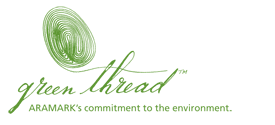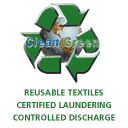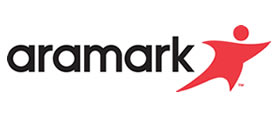- ONLINE RENTAL CATALOG
- Chef Wear & Aprons
- Dickies
- Enhanced Visibility
- Flame Resistant
- Food Processing Apparel
- Gloves
- Lab Coats
- Mats
- Microfiber Mops & Dusters
- Performance Polo
- Restroom Hygiene
- Scrubs
- TeamCasual® Apparel
- Towels & Storage
- Work Apparel
Environmental Stewardship
ARAMARK Uniform Services (ARAMARK) works hard to protect the environment and conserve natural resources across all of our facilities. Through our commitment to strict compliance and innovative technologies, we seek to ensure that ARAMARK meets or exceeds regulatory standards set for our laundry facilities. Using an ARAMARK industrial laundry process is much better for the environment than washing and drying items in smaller loads at home and potentially discharging untreated waste through the sanitary sewer system.
Monitoring of Environmental Compliance
ARAMARK regularly monitors Environmental Compliance at all of our active processing plants to assure that we meet all applicable federal, state and local regulations for:
- Air
- Wastewater
- Storm water management
- Spill prevention
- Solid waste disposal
We conduct routine sampling on air, wastewater, solid waste for conventional pollutants to assure compliance.
LaundryESP® (Laundry Environmental Stewardship Program)
ARAMARK, a charter member of LaundryESP®, participates in this voluntary, cost effective program designed to raise the environmental performance of textile service and supply companies and improve relations with customers. LaundryESP® is designed to build on the industry's existing strengths of recycling and reusability and its more efficient use of resources (water, energy and wash chemicals) when compared to home laundering. Since the program’s inception in 1999, the program’s results include:
- 11.8% reduction in energy use per pound of textiles processed
- 12.5% reduction in gallons of water used per pound of textiles processed
- 17,500 pound reduction in pollutant equivalents.
ARAMARK’s contributions to the successful reductions consist of 40% for water, 29% for energy and over 40% for pollutant discharges.
The Industry Leader in Wastewater Treatment & Waste Disposal
These efforts have enabled ARAMARK to achieve an excellent record of compliance with regulations governing wastewater discharge and solid waste management as well as all other applicable local, state and federal environmental regulations.
ARAMARK also has a strategic relationship with Ecolab, experts in the field of wash processing, which gives ARAMARK the unique ability to serve customers in a wide variety of industries. In addition, our partnership with Clearbrook Chemical, our wastewater chemical supplier has allowed us to achieve an excellent record of compliance with regulations governing wastewater discharge, as well as all other applicable local, state and federal environmental regulations.
We proactively work with our customers to determine which soils and contaminants their facilities generate. Then we plan accordingly to keep our environment safe and to help conserve our natural resources.
Environmentally Friendly Chemicals
ARAMARK is committed to laundering garments with environmentally friendly detergents. ARAMARK has undertaken an initiative that began in September 2006 to eliminate the use of detergents containing Nonylphenol Ethoxylate (NPE). The goal is to convert all US processing plants to a more environmentally friendly detergent by February 2009. ARAMARK’s Canadian based operations are already processing with these new environmentally friendly, NPE-free, products. In addition, ARAMARK has recently completed the transition to eliminate all phosphates from the laundering process and is now offering phosphate-free laundered merchandise to the customers we serve.
Heat Reclamation
ARAMARK reclaims and reuses 80% of the wastewater heat content from our wastewater, reducing the demand for natural gas. Incoming fresh water enters a laundry facility at a relatively low temperature and must be heated to 160° to effectively clean garments. Wastewater from the laundry process can be routed into a heat exchanger through which incoming water passes, raising its temperature above 90°. This process significantly reduces the energy required to heat incoming water.
Excess heat recovered is also from boilers using boiler stack economizers further reducing the need for natural gas.
Recycle
The rental laundry industry as a whole has been environmentally conscious for quite sometime. In fact, our re-use of uniforms and continuous roll towels (CRT) could be considered the ultimate in conservation efforts and alternatives to paper towels and disposables such as scrubs and patient gowns for the healthcare industry.
ARAMARK processes more than 460 million garments per year in the United States—the vast majority of which are delivered to customers on wire hangers that are discarded daily. ARAMARK has maintained a hanger recycling program for more than two decades. In an effort to reduce the dependence on natural resources and space in our landfills ARAMARK has intensified efforts to re-use at least 65% to 70% of hangers. ARAMARK also has teamed up with waste disposal companies to decrease the volume of scrap hangers along with pallets, cardboard, batteries and fluorescent lighting sent to landfills.
Fleet
ARAMARK step-van fleet drives the equivalent of 12 times around the earth every day. Through the use of a Global Positioning System (GPS) and a program exclusive to ARAMARK, we are driving fewer miles each day while delivering the same level of excellent service to our customers.
Other important fleet initiatives include moving toward alternative-fuel vehicles as well as improved fuel cost tracking and management. ARAMARK has begun two pilot alternative fuel programs. The first focuses on the use of several CNG trucks. The second pilot includes operating a demo hybrid-gas truck. Depending on the units' performance, additional vehicles could be added to the fleet. ARAMARK also plans to partner with the EPA and its SmartWay program.
Fuel management and tracking was another target area for improvement. Previously ARAMARK used multiple fuel vendors, complicating the process. ARAMARK has now contracted with a single, consolidated fuel program through one vendor and converted to online invoicing and centralized controls, which allows ARAMARK to project the number of gallons by type of fuel for a particular location.
Awards
ARAMARK has been recognized for three consecutive years by the Missouri Water Environment Association (MWEA) for complete pretreatment compliance. The Gold Industrial Wastewater Pretreatment Compliance Award is presented to companies who comply with all wastewater discharge and reporting requirements, have an industrial wastewater treatment facility or pollution program and must be in good relations with the nominating city or sewer district.
- Our Springfield, MO location won the Gold Award for outstanding performance of wastewater treatment system and our Oakland, CA location won the Green Industry award from Alameda County for environmental compliance.
- Four ARAMARK locations received Industrial Pretreatment Awards for meeting all compliance objectives: Charlotte, NC, Memphis, TN, Evansville, IN and Reading, PA.
- ARAMARK’s standard wash formula meets the “hygienically clean” criteria from the Center for Disease Control (CDC).
ARAMARK’s environmental stewardship program is an ongoing strategic business decision to continually research, develop and practice environmentally-friendly laundering and production methods.




